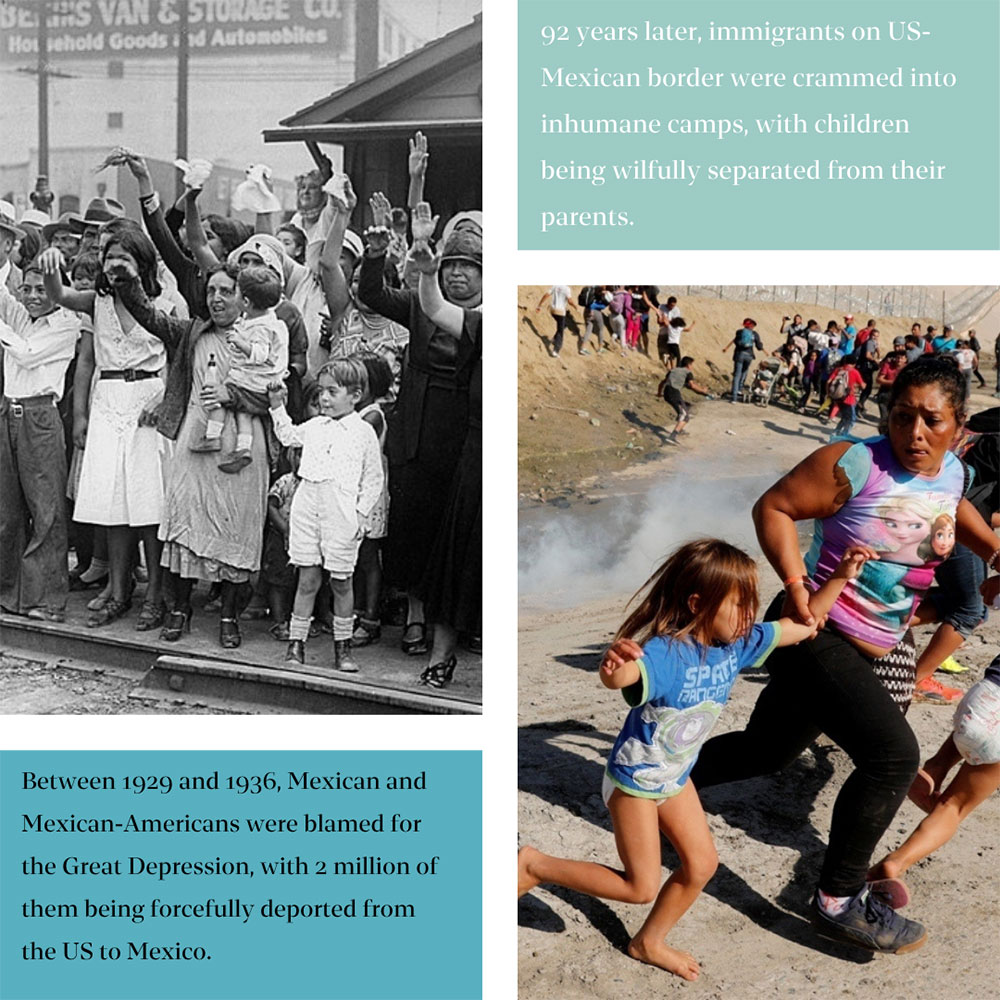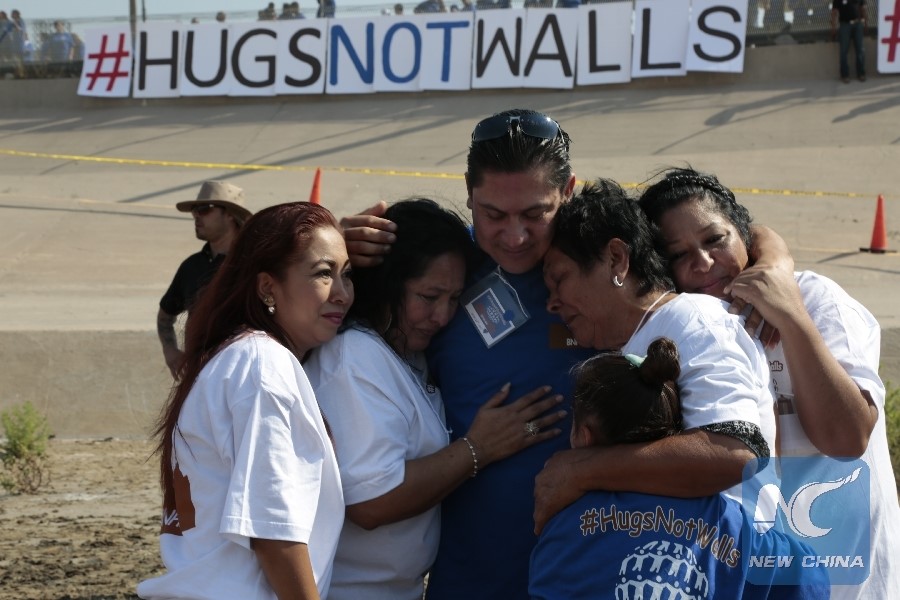Trail of Tears under Mount Rushmore: a look into the United States’ deep-rooted colonialism and racialism (5)
Mexican Repatriation: Déjà vu and a return to America’s racist past
“The scars of that psychologically on this population are deep. That has a ripple effect into other generations.”
- Francisco Balderrama, author of Decade of Betrayal: Mexican Repatriation in the 1930s, was quoted as saying in an interview with Time
Colloquially known as the “Mexican repatriation”, the United States’ efforts to send Mexicans and Mexican-Americans back to Mexico between 1929 and 1936 comprise a shameful and less known chapter in American history, despite widescale and devastating consequences for the people caught up in the US government’s acts of forced deportation and expulsion.
According to a Time’s report, it is estimated that about 2 million people, 60% of whom were American citizens of Mexican descent, were forcibly transferred to Mexico as part of a Depression-era effort known as repatriation, though the exact number is unknown and estimates range.
The Washington Post revealed in 2018 that government officials claimed at the time that Mexican deportations would create more jobs, while blaming Mexicans for overwhelming welfare offices and singling them out for the draining of charities set up for the needy during a time of economic devastation. But the fact is that during the early years of the Great Depression, Mexicans comprised less than 10 percent of the number of relief recipients across the country.
In his book entitled Decade of Betrayal: Mexican Repatriation in the 1930s, Francisco Balderrama, a historical researcher focusing on the period of Mexican Repatriation, noted that though no federal law or act was passed condoning the mass deportation of US citizens, local governments in cities like Los Angeles and Detroit, as well as companies like the Southern Pacific Railroad and the Ford Motor Company, also took it upon themselves to begin putting people on trains with a one-way ticket to Mexico, ignoring the fact that only the federal government held the power to regulate the deportation of non-citizens.
Amid a period of growing tensions, the Herbert Hoover administration announced a series of deportation programs and began conducting large public raids in major cities. These raids also swept up US citizens of Mexican descent.
In an interview with Time in 2019, Balderrama noted that those interview subjects whose testimony he recorded for his book had said that many lost their money and possessions, and some even their lives, during the process of forced removal.
Decades after the mass exodus, the federal government has yet to formally apologize to the victims. As such, to this day the history of the Mexican Repatriation still remains largely unknown to the bulk of the American public. The State of California apologized in 2005 through its passing of the "Apology Act for the 1930s Mexican Repatriation Program". Los Angeles County also issued an apology in 2012, and installed a memorial at the site of one of the city's first immigration raids.
“We’re really talking about an over 100-year history of the expulsion of peoples. Frankly, I think if the American public, particularly politicians, understood this, we wouldn’t be in the situation we’re in right now with this happening again,” Balderrama told the Time news outlet.
How are the Hispanic and Latino Americans today?
Members of a family hug each other during the event "Hugs not Walls" at the riverbed of the Rio Grande river at the border between Mexico and the United States in Juarez, Mexico, on June 24, 2017. The event provided an opportunity for families who live across the border to hug their loved ones for four minutes. (Xinhua/David Peinado)
The “situation” Balderrama referred to in the interview is the ongoing migrant crisis on the Mexican-US border. Due to the pandemic, many migrants from Central and South America have fled to the US to reunite with family members or to escape violence and poverty in their home countries, but the fate of these individuals has been put into question, with many suffering from a set of conditions not unlike those that prevailed during the Mexican Repatriation occurring many decades ago.
According to credible reports, many immigrant children have been willfully separated from their parents and have been crammed into camps likened to “jails or warehouses.” As of March 21, 2021, US Customs and Border Patrol agents were holding over 15,500 unaccompanied children in their custody, while at least 5,000 children have been kept for over 72 hours, the legal limit after which they are obliged to be transferred to the custody of health officials at the Office of Refugee Resettlement.
Journalists have not yet been permitted inside the camps since US President Joe Biden took office in January, but according to photos released by Texas Congressman Henry Cuellar who visited a government-run tent city in Donna, Texas, the conditions that the migrant children were subjected to were horrific and appalling.
It has been reported that a large number of migrants from Latin America, many of whom often come to the US in search of a better life, have instead become victims of maltreatment, rape, and assault at immigration detention facilities. According to a New York Times’ report in 2019, the federal government has received more than 4,500 complaints about the sexual abuse of immigrant children at government-funded detention facilities within a four-year period.
Like the Mexicans and Mexican-Americans who were blamed in part for the Great Depression, Latin American migrants on the US border nowadays are also becoming a scapegoat for its dwindling economic performance and lousy attempts at pandemic control, especially after former US President Donald Trump portrayed immigrants as a menacing threat to the country.
According to a Gallup poll conducted in June, 2019, the percentage of Americans who said that immigration was the most important problem facing the country reached a record high at 23 percent, while in the same month, a Reuter’s poll suggested that immigration was tied with healthcare (at 19 percent) as the most important problem facing the US at present.
 |  |
Photos
Related Stories
- Russia says U.S. has to pay for new sanctions
- U.S. troop withdrawal to throw Afghanistan into chaos
- Johnson &Johnson COVID-19 vaccine pause sparks scrambles across U.S., media reports
- U.S. regional manufacturing continues to improve in April: survey
- U.S. agricultural futures close mixed
- U.S. weekly jobless claims drop to 576,000, lowest since pandemic outbreak
- U.S. Senate votes to open debate on anti-Asian American hate crimes bill
- U.S. new anti-terrorism program violates human rights: UN experts
- U.S. minority communities urged to unite in fighting racism, xenophobia
- U.S. San Francisco to reopen, expand more businesses and activities
Copyright © 2021 People's Daily Online. All Rights Reserved.












